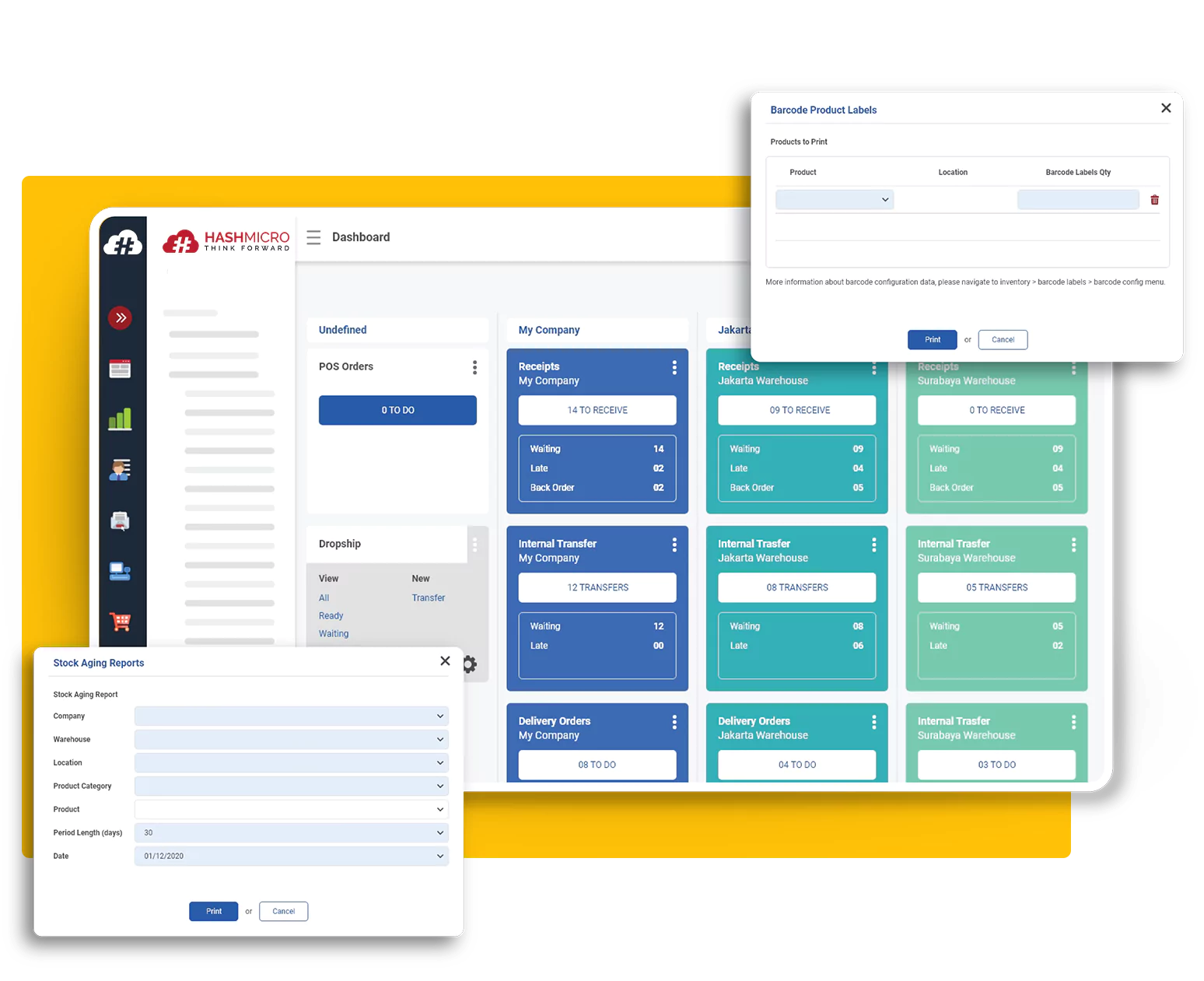In the modern aviation industry, I’ve seen firsthand how manual processes of recording and managing data slow down productivity. To stay competitive, these outdated methods need to be replaced with automated ERP systems that deliver maximum efficiency.
From my experience, an Aviation ERP System can resolve many of the complexities we face daily. It streamlines operations across finance, inventory, HR, CRM, procurement, and even manufacturing, all within a single platform. As aviation businesses become more connected and data-driven, having an integrated ERP is no longer optional, but essential.
That’s why I recommend exploring how this system can transform your operations. Ready to see it in action? Book your free demo today and experience the difference an Aviation ERP System can make for your business.
Key Takeaways
|

Why Does the Aviation Industry Need ERP Systems?
The role of an ERP system can assist you in incorporating new procedures and technological advancements into the day-to-day operations of your aircraft operational activities. The aviation industry needs the HashMicro ERP system mainly because of its advanced features and tools. The system provides a wide range of tools to help businesses in the aviation industry manage their resources.
Utilizing the system gives you benefits such as maintaining data consistency securely, managing inventory and supply chain, and streamlining accounting processes. Personally, I’ve seen how these improvements make decision-making faster and more accurate in aviation companies. For further explanation about the benefits of ERP, we’ll discuss them in the next section.
Benefits of ERP Software for the Aviation Industry
1. Streamlining accounting processes
Using only one dashboard, an ERP system will simplify your income tax filings since it is equipped with an automatic payment feature. It enables you to reduce expenses and boost business productivity. And since such a system can be integrated with bank accounts, it’s easy to track and verify various transactions efficiently. I’ve found this feature especially useful because it allows me to generate automated accounting reports within minutes.
2. Managing inventory

Maintaining a smooth and efficient inventory production process is crucial. ERP provides the tools you need to perform powerful inventory management. Optimizing inventory management with an ERP solution such as inventory management software can help you better track your inventory, reduce excess capital tied up in idle goods, and optimize your supply chain. An ERP solution in the aviation sector allows for increased visibility among all organizations involved in building, producing, and repairing aircraft. Whether you make parts, assemble and test the finished product, or sell it, ERP will help you have a higher inventory accuracy while lowering costs.
3. Generate multiple reports in real-time
HashMicro ERP enables you to conduct analytics and generate reports on your aviation company’s performance. The system will include dashboards, real-time reporting, searches, and key performance indicators (KPIs). These features will enable businesses to take actionable steps toward making strategic decisions based on accurate and current data in real-time, allowing you to make future business decisions for expanding your business.
4. Enhancing data security
A company’s ERP system can be a prime target for hackers, who seek to access financial documents, manufacturing blueprints, personal information about employees, and other sensitive data housed in an ERP system. However, a cloud-based ERP system will enhance data security by making it simpler to access data and continuously improve data security safely and securely. From my perspective, this gives aviation companies peace of mind, knowing that sensitive information is protected with the latest standards.
They still need to integrate the most up-to-date best practices for internet security (e.g., encryption). The worst thing that could happen is that it can create security holes, which makes it easy for hackers to access. However, a cloud-based ERP system will enhance data security by making it simpler to access data and continuously improve data security safely and securely. There is no reason for you to be concerned about the security of the data stored at your aircraft company.
5. International regulation and multi-currencies
The aerospace industry is complex and highly regulated. For example, regulations differ from country to country. Organizations must strictly adhere to them or risk being fined or losing their license before a company can do business with an international organization. Businesses that operate globally must localize their marketing materials, customer service documentation, and other materials. When dealing with international government regulations, the aerospace industry faces additional complexities. ERP systems can assist in navigating regulatory hurdles and keeping paperwork organized and up to date.
Internationally, the aviation industry is growing. As a result, interaction with other countries around the world is unavoidable. And it’s common knowledge that each country has its own currency. Manual conversion is inefficient. But don’t worry; the accounting features of ERP can solve this problem quickly and without a hitch; ERP will assist in instantly converting the multi-currency.
Also read: The Importance of ERP for the Aviation Industry and Its Trends
ERP Implementation in The Aviation Industry
Although some ERP systems have been built to accommodate the needs of general business operations, but aviation companies have unique requirements. ERP systems offer many benefits for businesses. For example, if you run a parts sales business in aviation, you may want to look into aviation-focused ERP systems. These systems are customized for the types of transactions that parts sellers, buyers, and repair businesses use and might be up your alley if you’re looking to increase productivity or enhance security.
ERP systems can be a worthwhile investment for the aviation industry since they can increase productivity or enhance security. An ERP system’s benefits can help make a company more substantial in the long term. A customizable ERP system is ideal for the aviation industry to meet its unique requirements and needs.
Read Also: Best ERP Software Recommendations – Explore the best software options available this year and find the right fit for your business needs.
Conclusion
The explanation provided above is strong proof that aviation ERP is an essential tool for the aviation industry. The capabilities of ERP Software can enhance the effectiveness of operations at an aviation company that manages procedures in the aviation or fleet industries, which are typically quite complex.
When an aviation company implements an ERP system in their daily operations, they are making the best long-term investment possible. Since it is common knowledge that airplanes have become an integral part of human life. It is not surprising that the aviation industry requires advanced technology.
Using Business Intelligence technology hosted on the ERP with a cloud-based system, an aviation company can make rapid and precise business decisions. And HashMicro ERP Software is the best solution for delivering on a company’s promise. Learn more about the software by downloading the pricing scheme to determine the software’s calculated price, or try the demo version for free here.

FAQ About Aviation ERP
-
What is ERP in aviation?
ERP (Enterprise Resource Planning) in aviation is an integrated software system that manages operations such as inventory, supply chain, finance, HR, maintenance, and compliance within a single platform. It helps streamline workflows, reduce errors, and support regulatory requirements in the highly complex aviation sector.
-
What ERP do airlines use?
Major airlines and MROs often use aviation-specific ERP solutions such as HashMicro, SAP, Ramco Aviation, and Oracle E-Business Suite. Smaller or mid-sized aviation companies may adopt specialized systems like Quantum Control, Pentagon 2000SQL, or Corridor to match their operational needs.
-
How is CRM used in aviation?
CRM (Customer Relationship Management) in aviation is used to manage passenger data, personalize services, and improve customer loyalty. Airlines leverage CRM for real-time communication during disruptions, loyalty program management, and tailored offers, helping enhance passenger satisfaction and retention.
































